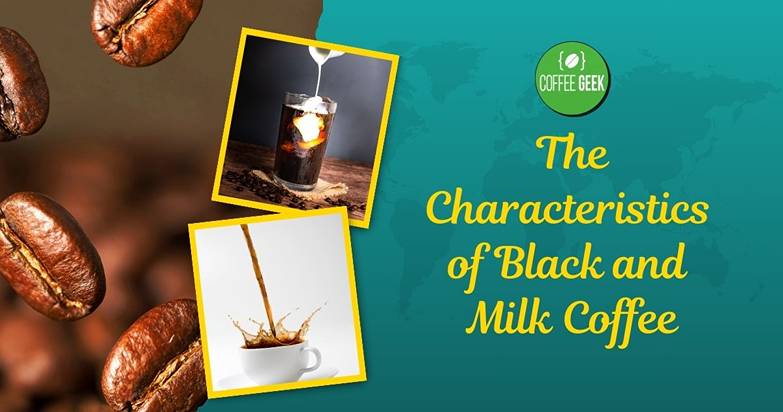Let’s dive into the buzz of the century – black coffee vs coffee with milk.
A topic that sparks numerous heated debates among coffee enthusiasts, baristas, and just about anyone who enjoys a cup of favorite coffee on a regular basis.
This detailed exposé aims to provide you with everything you need to know about the two types of coffee and equip you with the knowledge to decide which is more suitable for your taste and health preferences.
Understanding the Basics – Black Coffee vs Coffee With Milk
Defining Black Coffee

When we speak of black coffee, it typically refers to a cup of coffee that is served without the addition of milk, sugar, or cream.
This coffee type is made strictly from coffee grounds derived from coffee beans, with no additives.
Drinking a cup of black coffee can often be described as an acquired taste due to its robust and complex flavor profile.
What is Milk Coffee?
On the flip side, coffee with milk refers to the drink that’s made when you add milk to the coffee. This addition of milk serves to soften the strong flavor, offer creaminess, and generally add flavor variations.
The type and amount of milk added, whether it be whole milk or lowered calorie counterparts, can significantly alter the taste of the coffee drink.

The Black Coffee vs. Milk Diadem
The main debate in the “black coffee vs coffee with milk” showdown revolves around the flavor, texture, and health benefits of both these types of coffee.
While some prefer the strong, authentic taste of the black coffee, others enjoy the smooth, creamy texture and taste brought by milk in the coffee.
The Characteristics of Black and Milk Coffee
The Unique Taste Profile of Black Coffee
A cup of black coffee provides a unique taste profile that is rich, aromatic, and robust. This is the coffee type that enables you to truly taste and appreciate the nuances of different coffee beans.
For instance, some beans might have a fruity or floral note, while others might lean more towards chocolatey or nutty flavors. These are the flavors that coffee connoisseurs live for.
How Milk Alters the Taste and Texture of Coffee
The addition of milk to your coffee not only lightens its color but also transforms its flavor and texture.
Milk in your coffee acts as a buffer to the strong, acidic nature of black coffee, giving it a creamier texture, a sweeter taste, and making it more palatable for people who find black coffee a bit too intense.
Examining the Differences Between Black Coffee and Milk Coffee

Although both are made from coffee grounds, the differences between black and milk coffee are vast. Black coffee contains only the pure extract of the coffee bean, offering a strong, clean flavor.
Coffee milk, on the other hand, has been tempered by the addition of milk, softening the punchy intensity of black coffee and delivering a more gentle taste.
| Aspect | Black Coffee | Coffee with Milk |
|---|---|---|
| Color | Dark brown or black | Light brown or beige |
| Taste | Bitter and strong | Creamy and milder |
| Calories (8 oz cup) | 2 calories | Approximately 20-30 calories |
| Caffeine Content | Higher | Slightly lower |
| Acidity | Higher | Lower |
| Dairy Content | None | Contains dairy (milk) |
| Popular Variations | Espresso, Americano | Latte, Cappuccino, Mocha |
| Customization | Often consumed plain, can be sweetened or flavored | Frequently customized with syrups, sugar, or spices |
| Texture | Thin and watery | Creamy and smooth |
| Dietary Preferences | Vegan-friendly | Not suitable for lactose-intolerant or vegans without milk alternatives |
| Common Additives | Sugar, cinnamon, nutmeg | Sugar, cinnamon, whipped cream |
Health Benefits and Considerations
Health Benefits of Drinking Black Coffee
There are many health benefits to drinking a cup of black coffee, compared to milk coffee.
Due to its high antioxidant content, black coffee can help to combat inflammation in the body, coffee improves heart health, enhance brain function, and even aid weight loss.
Moreover, black coffee contains fewer calories compared to coffee with milk or sugar.

How Adding Milk to Your Coffee can Affect Your Health
When you add milk to your coffee, it’s important to keep in mind that it also increases the caloric content of your drink.
However, black coffee with milk – the addition of milk does offer some health benefits, such as supplying essential calcium and reducing the acidity of the coffee, which can be beneficial for people with sensitive stomachs.

The Effects of Milk on a Cup of Your Coffee
The effects of adding milk to coffee go beyond taste and texture.
The milk can interact with the compounds in coffee, reducing some of its antioxidant capacity. However, the overall health benefits of milk and black coffee combined can still make it a nutritious beverage option for many.
Deciding Your Coffee Type: Black Coffee vs. Coffee with Milk
Why Some People Prefer Their Coffee Black
Many people prefer to drink black coffee, citing its pure, bold taste, the lower calorie count, and its potential health benefits.
Some also relish the challenge of developing a palate that can appreciate the complex flavors of different coffee beans in their unadulterated form.
Pros and Cons of Adding Milk to Your Coffee
Adding milk to your coffee can make it more enjoyable for some, by softening its strong taste and adding a pleasant creaminess.
However, the addition also increases the calorie content and may decrease some of the health benefits of black coffee.
Conclusions: Choosing Your Type of Coffee

To conclude, the selection between black coffee versus milk coffee essentially boils down to personal preference and specific dietary necessities.
Whether you savor the strong taste of black coffee or prefer your coffee with the gentle flavors of milk and sugar, the choice remains entirely up to you.
Final Word
Summary of the Differences and Similarities
The central differences between black coffee and milk coffee lie in their taste, texture, and nutritional content.
Black coffee boasts a rich, bold flavor with numerous health benefits, while milk coffee offers a smoother, creamier flavor profile with extra calories owing to the milk and sugar.
Both types of coffee cater to different taste preferences and health requirements, emphasizing that neither is inherently superior or inferior to the other.
The Healthiest Choice Between Black and Milk Coffee
Defining the healthier choice between black and milk coffee can be tricky and subjective as it largely depends on individual preferences and health conditions.
However, if you’re watching your calorie intake, prefer a robust flavor, and are seeking substantial health benefits from your cup of coffee, black coffee may be the optimal choice.
Conversely, if you’re after a smoother, balanced flavor and don’t mind the extra calories, coffee with milk will be your perfect match.
Recap
The debate between black coffee and coffee with milk has been a long-standing one. Black coffee is made by steeping hot water through coffee grounds.
This method ensures that black coffee is stronger in flavor and aroma. An example of a strong black brew can be seen when water is poured over coffee grounds, ensuring a robust extraction.
In contrast, coffee with milk and sugar, often known as milk coffee, is prepared by adding these ingredients to either black coffee or espresso.
When considering nutrition, black coffee has a lower calorie count.
Specifically, a cup of black coffee typically contains little or no calories, whereas a cuppa prepared with milk, especially using whole milk, and sugar will invariably contain more.
This means milk coffee contains more calories compared to its black counterpart. Thus, if one is monitoring calorie intake, drinking black coffee can help maintain a balance.
Moreover, the consumption of coffee in any form has health benefits due to the antioxidants found in coffee. Black coffee also has a notable potassium content.
While coffee is a stimulant that can provide an energy boost, the addition of milk might temper the effect to some extent.
Some believe milk coffee helps prevent certain digestive issues, while others prefer the pure, unadulterated taste of black coffee.
Choosing between black coffee and different types of coffee prepared with milk comes down to personal preference.
If you like your coffee rich and creamy, then a moderate amount of coffee with milk and sugar might be your go-to.
But if you’re looking for lower calories than coffee with additives or a more potent taste, drinking your coffee black might be the way to go.
In essence, both milk coffee and black coffee have their unique attributes, making them favorites among different groups of coffee enthusiasts.
People Also Ask
What’s the main difference when you add milk to your black coffee?
When you add milk to your black coffee, it significantly changes its taste, texture, and nutritional content.
The bitterness of the coffee is reduced, and it also affects the coffee’s acidity and temperature.
Nutrition-wise, milk coffee has more calories compared to black coffee.
How does the coffee bean type affect the taste of black coffee vs. milk coffee?
The coffee bean type significantly affects the taste—both when you drink coffee as black and when milk is added.
Some coffee beans have a strong flavor that can be softened with the addition of milk, while others have a smooth taste that stands out even coffee without milk.
Is a cup of black coffee healthier than a cup of milk coffee?
Both drinks, black coffee or coffee with milk, coffee can provide their benefits. The content of black coffee is high in antioxidants that can improve heart health and help in weight loss.
On the other hand, adding milk to your coffee provides essential nutrients like calcium and vitamin B2.
However, it’s worth noting that a cup of black coffee contains fewer calories than coffee with milk if you are monitoring your calorie intake.
What are the effects of milk on an evening coffee drink?
A: If you’re having your coffee in the evening, adding milk can potentially help to soothe the digestive system and aid in sleep, due to the presence of the amino acid Tryptophan found in milk.
However, the caffeine content in your coffee might counteract this, so it’s best to limit your coffee consumption in the evening.
What’s the difference between instant black coffee and coffee made from coffee beans?
Instant coffee is pre-brewed coffee that has been freeze-dried or spray-dried. On the other hand, coffee is made from coffee beans, freshly brewed at the time of consumption.
The taste, aroma, and nutritional content are generally richer and more complex in a freshly brewed cup of black coffee compared to instant coffee, whether you add milk and sugar or not.
Can black coffee and coffee with milk help in improving focus and productivity?
Yes, both black coffee and coffee with milk can enhance focus and productivity. This is primarily because of the caffeine content, which stimulates the nervous system.
While the water and coffee beans contribute to this in black coffee, the addition of milk to coffee doesn’t alter this benefit.
Do the benefits of black coffee decrease with the addition of sugar and milk?
While the primary benefits of coffee intake – such as boosting energy levels – remain, adding sugar and milk could reduce some health benefits.
For instance, a cup of black coffee contains almost no calories, but this changes with sugar and milk.
Furthermore, the addition of sugar and milk, especially in large amounts, can lead to weight gain and other health issues.
What is the ideal amount of coffee to drink daily, whether it’s black or with milk?
Generally, it’s considered safe to consume up to four cups of coffee a day.
However, this may vary based on individual tolerance to caffeine. Also, one must take into account the calories if the coffee has milk and/or sugar added.
Is there a significant difference in the caffeine content of black coffee vs milk coffee?
Generally, the caffeine content remains the same whether you have your coffee black or with milk. It’s the type and amount of coffee beans used that primarily determines the caffeine content.
Are there any other notable differences between black coffee and coffee with milk?
Apart from taste and nutrition, one significant difference lies in their preparation. Black coffee can be as simple as hot water and coffee, while coffee with milk requires additional steps.
Also, the shelf life of black coffee is longer as it doesn’t contain milk, which can spoil.

